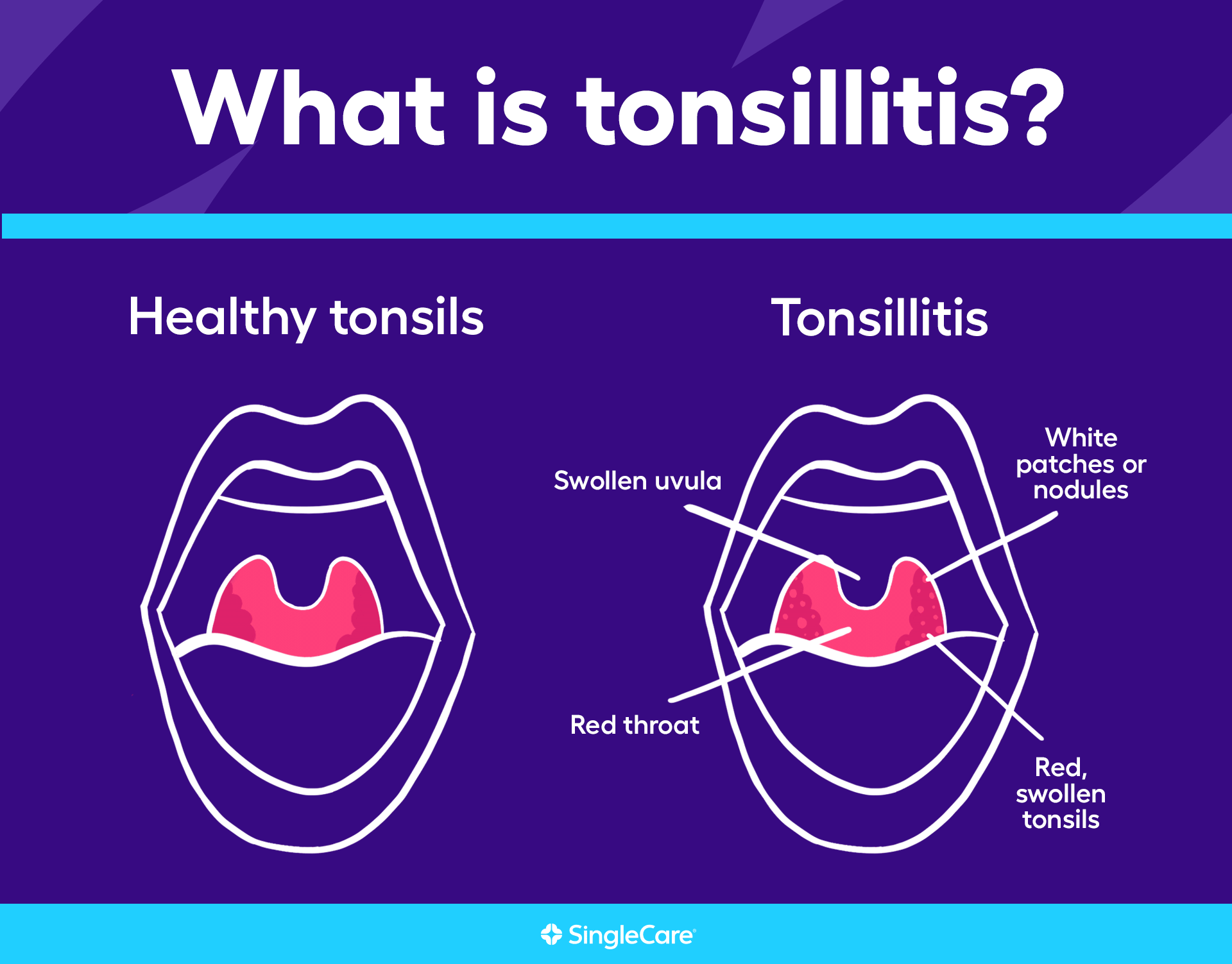Key takeaways
Tonsillitis is an infection causing inflammation of the tonsils that can last between four to 14 days if untreated. It’s usually more severe than a common cold and mainly affects children.
The condition is highly contagious, spread through close contact, sneezing, or coughing, and is caused by either viral or bacterial infections, with viral infections being the most common cause.
Common symptoms include throat pain, swollen lymph nodes, difficulty swallowing, and fever, with severe cases possibly leading to difficulty breathing or excessive drooling in young children.
Treatment options range from home remedies and over-the-counter medications for mild cases to antibiotics for bacterial infections and possibly surgery for recurrent cases impacting quality of life.
When something in your body doesn’t feel right, you’re probably acutely aware. Maybe you have a sore throat and you eat a few lozenges to soothe your symptoms. Or perhaps you take a few ibuprofen to help with a headache. But what does it mean when you have a cluster of symptoms that worsens and lasts longer than you thought they would (or should)? For some, it could indicate a case of tonsillitis.
A range of illnesses include a sore throat, congestion, or even chills. To know if it’s tonsillitis causing your symptoms, read on to learn the most common indicators—and their treatment.
What is tonsillitis?
Tonsillitis is an infection that causes inflammation of the tonsils, two pieces of tissue that are located in the back of the throat. Individuals typically experience symptoms that are more severe than simply a common cold such as swollen lymph nodes or fever.
While this condition might sound quite serious at first, in reality, tonsillitis is a fairly common illness. It most commonly affects children. Though some adults can experience this condition, it’s often mistaken for a simple sore throat or another type of infection. If left untreated, tonsillitis can last between four and 14 days.

What causes tonsillitis?
Viral or bacterial infections can cause tonsillitis.
Most cases of tonsillitis are viral infections. Many viruses can cause tonsillitis, including the same virus that’s responsible for Epstein-Barr virus, also known as mononucleosis.
But, some can be caused by a bacteria—most commonly Streptococcus pyogenes (also known as Group A Strep), the same culprit behind strep throat (streptococcal pharyngitis) and, when left untreated in certain populations, scarlet or rheumatic fever.
Tonsillitis is very contagious, meaning you can catch it easily. It is passed from person to person through close contact, sneezing, or coughing. As germs leave an infected person’s body, they enter your nose and mouth, and can cause illness if your immune system doesn’t fight them off. If you’re sick, it’s important that you take steps to avoid infecting others—like staying home, covering coughs or sneezes, or wearing a mask. Or, if someone you know is currently sick, it’s smart to keep your distance.
RELATED: Mononucleosis treatments and medications
Tonsillitis symptoms
The most common symptoms of tonsillitis include:
- Throat pain
- Swollen lymph nodes in the neck
- A red and swollen throat
- Difficulty swallowing
- A fever greater than 100.4 degrees Fahrenheit
- Possible voice changes
These more serious symptoms warrant an urgent provider visit:
- Excessive drooling in young children
- Jaw stiffness
- Difficulty breathing
“Tonsillitis can be bacterial or viral and both can present with similar symptoms of sore throat and fever; bacterial tonsillitis usually worsens quickly—especially in adults and can be associated with severe pain,” explains Jacqueline Jones, MD, an otolaryngologist at Park Ave ENT in New York City.
Symptoms for viral or bacterial tonsillitis, including strep throat, are similar and while the two are connected, they aren’t exactly the same thing.
RELATED: Tonsillitis vs. strep
Diagnosing tonsillitis
Visiting a doctor can help you to obtain a diagnosis and differentiate whether you have a viral throat infection or a bacterial case. Some healthcare providers will use a throat culture to distinguish viral from bacterial tonsillitis. There is very good evidence that you don’t have to do a rapid strep test or throat culture to distinguish between bacterial and viral tonsillitis if you use a clinical tool such as the Centor criteria.
If healthcare providers run a rapid strep test, they may still send results to a lab because the accuracy of the tests is only 90%. These cultures are captured through a throat swab directly on the tonsil and may be momentarily uncomfortable.
- Acute tonsillitis: If you experience tonsillitis on occasion, your primary care provider or an urgent care provider might describe your condition as acute.
- Chronic tonsillitis: When tonsillitis is present more often than not, you consider seeking care with an ear, nose, and throat specialist (ENT), also known as an otolaryngologist. Chronic cases are usually caused by group A streptococcus, also known as strep bacteria, and often occur after a viral acute episode.
Dealing with tonsillitis only once or having it become a frequent part of your life can be frustrating, as throat pain coupled with a range of other symptoms can impact your quality of life.
Tonsillitis treatment
If you’re struggling to function because your symptoms are just too severe, you should see your provider. If you only notice a few of the issues listed above, home remedies might be able to offer enough relief. In many cases, you’ll find that you can reduce your symptoms in a combination of ways.
At-home treatment for tonsillitis
Maybe you don’t have health insurance and want to avoid incurring a doctor’s bill, or you simply prefer to treat illnesses without antibiotics when you can. No matter your motivation, there are several home remedies for tonsillitis. Since many cases of tonsillitis will subside on their own, the main focus of treatment is to alleviate the discomfort associated with certain symptoms and stay hydrated.
Over-the-counter remedies and lifestyle changes can help:
- Take acetaminophen or ibuprofen to alleviate pain and fever
- Drink clear liquids or suck on ice or popsicles
- Suck on throat lozenges
- Gargle with salt water
- Keep your bedroom moist at night with a humidifier
RELATED: 24 sore throat remedies
Medication
If a virus is causing your tonsillitis, a prescription won’t help. If your infection is bacterial, you might need antibiotic treatment to cure symptoms. The most common medication used to treat this condition is penicillin, but for older children, adolescents, and adults even bacterial tonsillitis can resolve without antibiotics.
Surgery
For recurring infection of the tonsils that is impacting your quality of life, your healthcare provider might recommend you see an ENT specialist.
“Patients with recurrent tonsillitis may consider tonsillectomy or surgical removal of the tonsils. In general, we recommend a tonsillectomy if someone experiences more than seven episodes in one year, more than five episodes per year for two consecutive years or at least three episodes per year for three consecutive years,” says Omid Mehdizadeh, MD, otolaryngologist and laryngologist at Providence Saint John’s Health Center in Santa Monica, CA. “Other factors may be considered including difficulty swallowing, difficulty breathing, or incidence of a peritonsillar abscess.”
Surgery can seem like a drastic step; however, if your tonsillitis is contributing to obstructive sleep apnea or other serious health issues, it’s something you may want to consider. A trusted ENT can make this recommendation, and in many cases, surgical options are the last resort when all other treatment methods have failed.
For some, tonsillitis is an occasional issue that can affect about a week of one’s life, while others struggle with it on an ongoing basis. If you have several of the most common symptoms associated with tonsillitis, it’s important to see a doctor as soon as you can. Consider utilizing some home remedies to ease your symptoms until your appointment, and make sure to work with your physician to develop a plan of treatment that works best for your needs.




